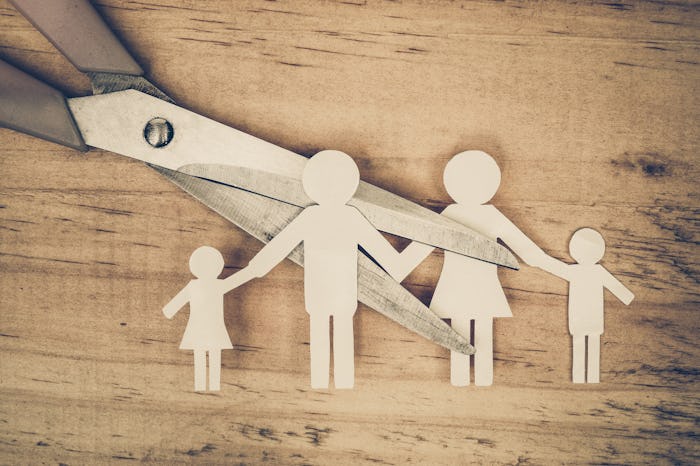Life

How To Talk To Your Kid About Divorce
With divorce comes turmoil, tears, heartbreak, and pain — all things parents want to protect their children from. Which is why knowing how to talk to your kid about you and your partner's divorce is of the utmost importance. During the very emotional time of separation, so many feelings are being sorted out and, when considering children, there must be a thoughtful way of delivering the news.
First, know you are not alone. According to the American Psychology Association (APA), stats say that 40 to 50 percent of marriages end in divorce. Because of this high rate and the effects divorce can have on families, there are many experts who have weighed in on the best ways to talk to your kids. According to Psychology Today, how a child is told about the divorce will stay with them for a lifetime and, in order to help with any lasting trauma, it's best to "give much thought to the setting and circumstances when you break the news." That setting should include mom and dad telling the kids as a family. This allows kids to understand that, even though the living dynamic is changing, the love, care, and security will always be there.
"The most important things for a child to understand as their parents separate is that the split is in no way their fault, that they are safe and loved by both parents no matter what, and that things will change, but who their parents are will never change," Rebecca Nidorf, licensed clinical social worker and therapist,says in an interview with Romper. "Family is family, even in this new configuration."
Not only should parents make sure their child knows it's not her fault, but psychotherapist Lisa Herrick wrote on her website that they should also reiterate that point even months later. She also wrote that it's good to avoid blame so, "the children are free to continue loving each parent fully without fear of betraying other parent or feeling disloyal."
It's also helpful to be direct when talking to your kids and to keep it simple. "Your child needs to know only one truth. Mom and Dad don’t love each other anymore the way that moms and dads need to love each other to stay together," licensed clinical psychologist Edward D. Farber told HuffPost. "Your child has absolutely no need to know the reasons Mom and Dad don't love each other." Blame shouldn't be placed on either parent — bad mouthing your ex will only hurt your child.
In talking with your kids, let them know how the divorce will change their day-to-day. This is where, Nidorf says, you need to get specific, "to make it the new normal rather than the 'dark unknown.'" She suggests you let your kids know what life will look like in terms of their house, room, and where they will be on what day. "Explain that you will continue to co-parent, to attend school performances, sporting events, and anything that their children are involved in," Nidorf says. "And discuss their health and well-being as always, and that their well-being is the most important thing to both parents."
This reassurance helps to calm worries and concerns your kid will naturally have. Divorce creates a feeling of uncertainty for everyone involved, but when parents navigate the early days with care and consideration for the future and everyone's happiness, children get the sense of security that they need.
With creating secure feelings in mind, avoid words of apology because, as Nidorf says, "apologizing is taking blame for something and indicates to your child that you did something wrong." Instead of saying "I'm sorry" to your child, show empathy. Nidorf recommends saying something like, "I understand that this is painful for you, and I want to help you through that pain any way I am able".
When my ex-husband and I were going through a divorce, we let our 3-year-old twins know that we were still a family, we just live in different houses. This is something we continue to talk to them about four years later, especially now that our children have more questions about it since they were so little when we separated. In doing so, we've created a happy and healthy environment for our children.
"Modeling for your child that life deserves to be lived in a happy and healthy way in happy and healthy relationships is a positive message," Nidorf says.
Divorce is going to be difficult and it's key to take the time to breathe and stay calm for your child as well as yourself. It's all about going through this time thoughtfully, and with the love for your child and self in your heart.